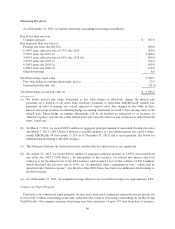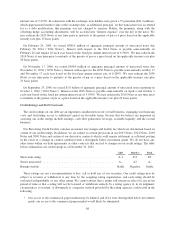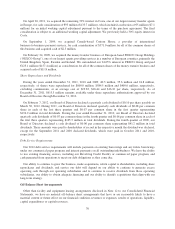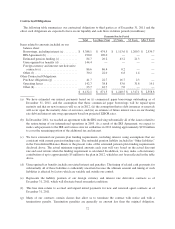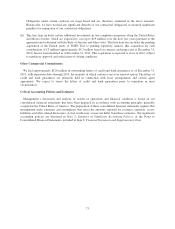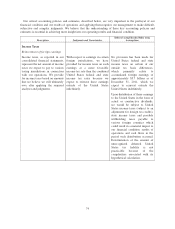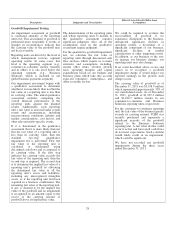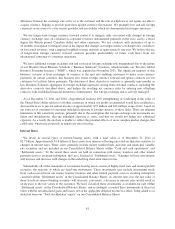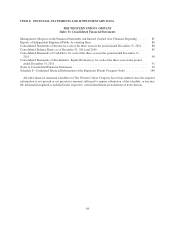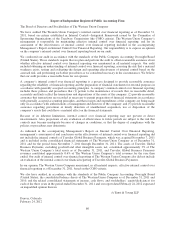Western Union 2011 Annual Report Download - page 83
Download and view the complete annual report
Please find page 83 of the 2011 Western Union annual report below. You can navigate through the pages in the report by either clicking on the pages listed below, or by using the keyword search tool below to find specific information within the annual report.
Description Judgments and Uncertainties
Effect if Actual Results Differ from
Assumptions
Derivative Financial Instruments
We utilize derivatives to
(a) minimize our exposure related
to changes in foreign currency
exchange rates and interest rates
and (b) facilitate cross-currency
business-to-business payments by
writing derivatives to customers.
We recognize all derivatives in
“Other assets” and “Other
liabilities” in our Consolidated
Balance Sheets at their fair value.
Certain of our derivative
arrangements are designated as
either cash flow hedges or fair
value hedges at the time of
inception, and others are not
designated as accounting hedges.
Cash Flow hedges—Cash flow
hedges consist of foreign currency
hedging of forecasted revenues, as
well as, from time to time, hedges
of the forecasted issuance of fixed
rate debt. Derivative fair value
changes that are captured in
accumulated other comprehensive
loss are reclassified to earnings in
the same period or periods the
hedged item affects earnings, to
the extent the change in the fair
value of the instrument is effective
in offsetting the change in fair
value of the hedged item. The
portions of the change in fair value
that are either considered
ineffective or are excluded from
the measure of effectiveness are
recognized immediately in
“Derivative gains/(losses), net.”
Fair Value hedges—Fair value
hedges consist of hedges of fixed
rate debt, through interest rate
swaps. The changes in fair value of
these hedges, along with offsetting
changes in fair value of the related
debt instrument are recorded in
interest expense.
The accounting guidance related to
derivative accounting is complex
and contains strict documentation
requirements.
The details of each designated
hedging relationship must be
formally documented at the
inception of the arrangement,
including the risk management
objective, hedging strategy,
hedged item, specific risks being
hedged, the derivative instrument,
how effectiveness is being
assessed and how ineffectiveness,
if any, will be measured. The
derivative must be highly effective
in offsetting the changes in cash
flows or fair value of the hedged
item, and effectiveness is
evaluated quarterly on a
retrospective and prospective
basis.
If the hedge is no longer deemed
effective, we discontinue applying
hedge accounting to that
relationship prospectively.
While we expect that our
derivative instruments that
currently qualify for hedge
accounting will continue to meet
the conditions for hedge
accounting, if hedges do not
qualify for hedge accounting, the
changes in the fair value of the
derivatives used as hedges would
be reflected in earnings which
could have a significant impact on
our reported results.
As of December 31, 2011, the
cumulative pre-tax unrealized
losses classified within
accumulated other comprehensive
loss from such cash flow hedges
that would be reflected in earnings
if our hedges were disqualified
from hedge accounting was $3.9
million.
As of December 31, 2011, the
cumulative debt adjustments from
our fair value hedges that would be
reflected in earnings if such hedges
were disqualified from hedge
accounting was a $23.9 million
gain.
76


